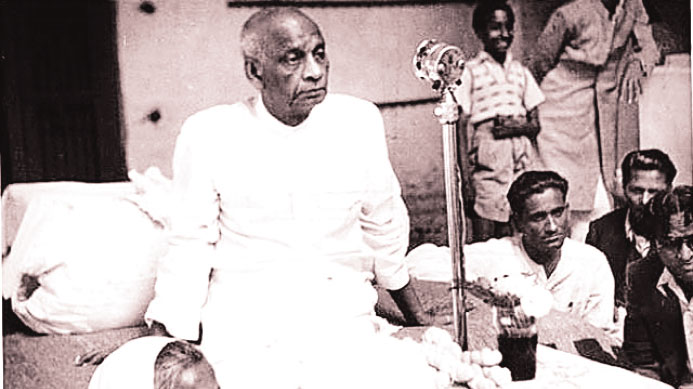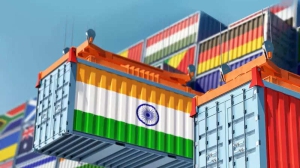As India celebrates Sardar Patel’s birth anniversary, we will do well to remember the Ironman, who, bestowed with immense determination, courage and commitment to the motherland, created united India
Generations ahead would find it difficult to believe how the British had planned a partition of India into three entities — India, Pakistan and Princestan. The third entity was mooted by Winston Churchill, who never reconciled to the idea of independent India. Creating three nations, he visualised, would sustain considerable British influence even after India’s independence was grudgingly granted. The tricky situation was left to be handled by Vallabhbhai Patel.
This has been concisely described by historian RNP Singh in his latest volume, ‘Sardar Patel, Unifier of Modern India’: “Though Sardar was then a helpless witness, he commented later, “nobody could have been so innocent or ignorant as to presume that overnight small rulers could be converted into Their Majestiesâ€. That position would have been full of dangerous possibilities and potentialities. In its May 16, 1946, statement, the Mission virtually put a seal on the princely States sovereign status by declaring, “Paramountcy can neither be retained by the British Crown nor transferred to the new Government.†The machinations and manipulations of the British and their cronies in undivided India created a situation in which it was impossible to create a unified nation. It could have led to India’s dismemberment into numerous principalities and nationalities!
The Memorandum on State’s Treaties and Paramountcy, issued on May 22, 1946, led to the interpretation by several princely States that after the departure of the British, they could negotiate with India or Pakistan on ‘equal terms’ on their future relationship with the ‘outside world’. Several of the Princes, led by Nawab of Bhopal, began preparations for their own strategic liberties. Nawab Hamidullah Khan of Bhopal considered it infra dig to be in a situation to negotiate with the Government of India. He was in close touch with the Nizam of Hyderabad. He quit his position as the Chancellor of the Chamber of Princes and declared himself free and independent. After the Instrument of accession was devised, major States, like Bhopal, Junagadh, Hyderabad, Jodhpur and Mysore did not initially show much keenness to put their signatures on it. It is indeed a very interesting chapter of modern Indian history as to how, Sardar Patel, ably assisted by VP Menon, could devise a comprehensive strategy that brought all the Princes within the fold of an integrated Indian Union.
The Nawab of Bhopal wished to become the successor Governor General of Pakistan after Jinnah. Junagadh declared its accession to Pakistan. Hyderabad found natural kinship with Pakistan. There were also other Princes who could feel the pulse of their people, could read the trends of the times and knew that accession to the Indian Union was the best possible alternative available to them.
Sardar Patel gave them due dignity and assured to look after their interests even after accession to the Indian Union. It was liked by Maharajas of Baroda, Bikaner, Patiala, and others. This group did not ignore the sacrifices people had made as Indians during the freedom struggle. They would settle for nothing lesser than popular elected Governments in a truly democratic setup. It was indeed a stupendous task to bring together 565 States within the fold of the Indian Union, and rein in the ambitious and deviant Nawabs and Nijams. That such an unprecedented accession to the Indian Union could be achieved, poses the obvious query: Who could do it, and how was the miracle achieved? Yes, India needed an Ironman of determination, unprecedented courage and unmatched commitment to the motherland. The Sardar of Bardoli, the leader of the farmers of Kheda in Gujarat, fitted perfectly well in the mould. India was fortunate to have entrusted the task of uniting India to Sardar Vallabhbhai Patel.
To visualise the persona of the Sardar during his last five years, a single instance would suffice. On October 26, 1947, Pakistan attacked the Kashmir Valley. Claimed as the Kabaili invasion, it was the handiwork of the Pakistan Army, it got the full assistance of the Muslim soldiers of Maharajah Hari Singh who deserted their posts to join the enemy forces after killing their Commanding Officer Lt Col Narain Singh. While the State was being overrun by invaders from Pakistan and internal saboteurs, Jawaharlal Nehru dithered to send the Indian Army on account of inadequacies of formalities.
Description of a top-level meeting held on October 26, 1947, says it all: “Lord Mountbatten exhibited studied diffidence. Pandit Ji (Nehru) presented a picture of acute anxiety and concern. Sardar listened but did not utter a word. He was a picture of calm equipoise. His silence was a strange contrast to a picture of defeatism and helplessness that otherwise pervaded in the meeting. Suddenly Sardar moved in his seat and immediately after his gruff and resolute voice attracted everybody: “Look here Generals, Kashmir must be defended at all costs and come what may, resources or no resources…This must, must and must be done. Do whatever you like but do it.†Even after the Kashmir issue is, hopefully, resolved in the future, the query would survive: What if Sardar Patel had handled the Kashmir’s accession also?
Integrating all the princely States was a unique unprecedented historical challenge before a newly independent India that was reeling under the debilitating impact of Partition, sweeping poverty, illiteracy and communal dissensions. Only an exceptionally astute person could take the gauntlet and plunge himself to the task of creating a united India out of the chaos inherited. The rustic looking farmer from Kheda changed the direction of history and rest is the saga for generations ahead to marvel at his unparalleled achievements.
It is no secret that during the first couple of decades, after independence, Sardar Patel’s contributions were somehow not given the pride of place in the narratives of freedom struggle; though the generation, that had participated in the independence movement, adored and admired him intensely. Some recent studies focus on the contributions of Sardar, revealing instances, anecdotes and facts that are not only interesting but also of immense value for the students of statecraft.
Problems posed by the rulers of several States, particularly Bhopal, Junagadh and Hyderabad, were unique and each one needed a unique strategy, in accordance with local needs and requirements. The complexity of the entire situation can be visualised. It was really tough to handle one of the biggest problem of migration of population that too under severe religious animosities created by vested interests. The declaration accession to Pakistan by Junagadh, or uncontrolled ambitions of Nawab of Bhopal, or the ballooning aspirations of the Nizam of Hyderabad, supported through persistent machinations indulged in by Jinnah needed an extraordinary analytical brain and a discerning mind to keep a tight grip on the situation.
Some of this can be visualised from what VP Menon wrote: “Jinnah signed a blank sheet of paper and gave it to Maharaja Hanwant Singh of Jodhpur along with his fountain pen, saying you can fill in your conditions.†It also indicates how tough the task before Sardar Patel was. In the case of Hyderabad, he knew Mountbatten was talking of “settlementâ€, and nothing was coming out of it! He firmly declared: “The terms and talks which Lord Mountbatten have gone with him. Now the settlement with Nizam will have to be on lines of other settlements with the States. No help from outside, on which he seems to rest pathetic hopes, would avail him.â€
The Hyderabad issue went to the security council — razakars were indulging in arson, looting and communal killings, Pakistan was not sitting quiet. But Sardar Patel remained unruffled and eventually won universal praise and admiration in this case as well. He had his issues with the Prime Minister, too. When Sardar Patel wanted a firm and definite action, he was concerned because of vacillations on the part of Nehru. His steely resolve helped him get his way thorough eventually in spite of numerous impediments. Patel’s letter to Nehru on China appears so precise to comprehend the mischievous and nefarious designs that this neighbour of India has nourished all along.
The letter Sardar Patel wrote to Pandit Nehru on November 7, 1950, highlights his incisive analytical vision of the developing international scenario, particularly on its borders, and how India needs to prepare itself for every eventuality. In the letter, he clearly indicated to Pandit Nehru that “even though we regard ourselves as friends of China, the Chinese do not regard us as their friends. With the Communist mentality of ‘whoever is not with them being against them’, this is a significant pointer, of which we have to take due note.â€
Unfortunately, this warning was ignored, and the consequences are now well-known. Sardar Patel richly deserves his due place in the saga of Indian Independence and integration. It is not easy to pay tribute to the Sardar of Bardoli. Lord Mountbatten’s words make one attempt, in touching words he wrote: “By far the most important achievement of the present Government is the unification of the States into the dominion of India. Had you failed in this, the results would have been disastrous...Nothing so added to the prestige of the present Government than the brilliant policy you have followed with the States.†The Statue of Unity being inaugurated on October 31, 2018, is one welcome step in the right direction. Much more must follow.
(The writer is the Indian Representative on the Executive Board of UNESCO)


























